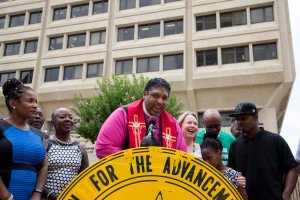I have been a bit remiss in reporting on this case. If you want daily trial updates, you should visit Rick Hasen’s Election Law Blog via the Winston-Salem Journal.
After two weeks of testimony, the Plaintiffs rested their case this week. The state of North Carolina will present its defense beginning Monday. The Winston-Salem Journal reports, Plaintiffs rest case in federal trial over NC voting law:
 After two weeks, attorneys representing the N.C. NAACP and other groups rested their case Friday, having called more than 40 witnesses who testified either in court or via video depositions, that North Carolina’s election law is racially discriminatory.
After two weeks, attorneys representing the N.C. NAACP and other groups rested their case Friday, having called more than 40 witnesses who testified either in court or via video depositions, that North Carolina’s election law is racially discriminatory.
Now, it is the state’s turn to present evidence. Attorneys representing North Carolina and Gov. Pat McCrory called Janet Thornton, an economist, as their first witness. Thomas Farr, one of the attorneys for the state, said they expect to finish presenting evidence by Wednesday.
The N.C. NAACP and other groups, including the U.S. Department of Justice, are suing North Carolina and McCrory over House Bill 589, which passed both chambers of the General Assembly in July 2013. McCrory signed the legislation into law in August 2013. The law eliminated same-day voter registration, reduced the days of early voting, got rid of preregistration of 16- and 17-year-olds and prohibited out-of-precinct provisional voting, among other provisions.
The case is being closely watched statewide because the law is one of the most comprehensive election law changes since the U.S. Supreme Court ruled in 2013 to invalidate a key section of the Voting Rights Act of 1965. That section required 40 counties in North Carolina and other states to seek federal approval for election law changes.
Over the past two weeks, plaintiffs have called expert witnesses, state Democratic legislators and North Carolina residents to the stand to prove that state Republican legislators passed House Bill 589 with discriminatory intent and that the law imposes a disproportionate burden on blacks, Hispanics, poor people and young people who want to vote. Plaintiffs have argued that state Republican legislators showed discriminatory intent because in April, the House passed a smaller version of House Bill 589 that dealt only with photo ID and waited until the U.S. Supreme Court decision to introduce a dramatically revised House Bill 589. That revised bill, which ran 57 pages, passed through both chambers of the General Assembly in two days.
In court documents and through cross-examination, state attorneys have argued that North Carolina is under no obligation to provide things such as early voting and same-day voter registration, that the law is racially neutral and that it applies equally to everyone, regardless of race. One of the major points that state attorneys have pushed is that black voter turnout increased in 2014, when many of the law’s provisions were in place, as compared to 2010.
Thornton testified that her analysis of data indicated that black voter turnout increased at a higher rate in 2014 than it did in 2010, both in early voting and on Election Day. Thornton also testified that people registered to vote at higher rates between 2012 and 2014 than they did between 2008 and 2010.
State attorneys are arguing that there can be no claim of burden on black voters if black voters cast ballots at higher rates in 2014 than they did in 2010. Experts for the plaintiffs testified under cross-examination that there were other factors for the higher black turnout, pointing specifically to the highly contested and expensive U.S. Senate race in 2014 between Kay Hagan and Thom Tillis.
The defendants have a much shorter witness list, which also includes state Elections Director Kim Strach and a number of expert witnesses to rebut the plaintiffs’ experts.
The last witness to testify in court for the plaintiffs was James Leloudis, a professor of history at UNC Chapel Hill. Leloudis gave an overview of 150 years of North Carolina history, from the end of the Civil War to the present. He described three different points in history in which black North Carolinians pushed for and got expanded voting rights that was then followed by efforts to curtail those rights. For example, Leloudis said, poll taxes and literacy tests were instituted during the Jim Crow era as ways to suppress the black vote.
In the 1960s and ’70s, state legislators made redistricting changes to increase obstacles to blacks getting elected to office, he said.
House Bill 589, which became law in 2013, fits into that same historical pattern, Leloudis said. House Bill 589 eliminated or curtailed provisions that had been passed in previous years as a response to North Carolina’s racially discriminatory history of denying or restricting the vote to blacks, Leloudis said.
Phil Strach, Kim Strach’s husband and one of the attorneys representing the state, asked Leloudis a series of questions about the progress that blacks have made politically. Strach said that the number of blacks in the General Assembly has increased over the past 25 years and has included having the first black speaker of the House, Dan Blue, in the 1990s.
Leloudis said there’s no question that progress has been made, but he added a caveat.
“The state has changed,” he said. “I’m not sure that change, as welcome as it is, is evidence that more change is unneeded.”
I will check the trial status for closing arguments later this week. Then it is waiting on the Judge to rule, which will be appealed by the losing party.
